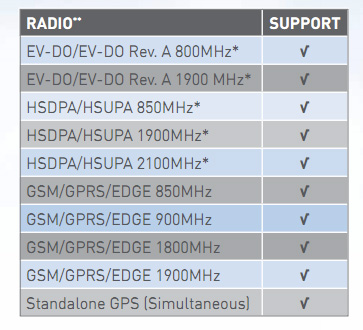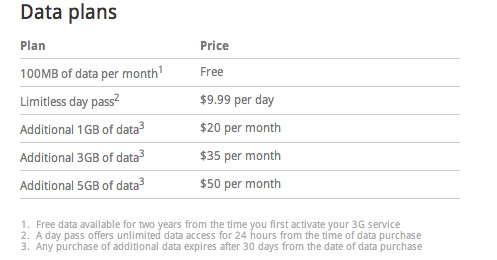Anand's Thoughts on Google's Chrome OS
by Anand Lal Shimpi on December 8, 2010 6:23 PM ESTConnectivity Brilliance: Free Cellular Data with Every Chrome Notebook
Chrome OS relies on you using a web browser for all of your PC usage and as a result, is more dependent on internet access. Thankfully the smartphone revolution has positively impacted wireless data availability and Google is capitalizing on that.
All Chrome OS systems will offer both WiFi and cellular data connections. Initial Chrome hardware will feature Qualcomm’s Gobi modem which supports the following networks:

Gobi also provides GPS so you get the same sort of data access and connectivity that you would on a smartphone. To be honest it’s a shame that all existing notebook manufacturers don’t provided this sort of access. I’d hope that availability of Chrome notebooks would change this for everyone.
In addition, Google extended its already far-too-cozy partnership with Verizon to enable a pretty sweet deal for Chrome notebook users. For the first two years of ownership, once you activate 3G service, you’ll get 100MB of free data transfers every month with your Chrome notebook. If you’re mostly using the web in locations where you have WiFi and just need to rely on 3G occasionally, this may actually be enough to get you by.
Verizon will also offer unlimited data $9.99 day passes with no recurring billing/contract required. If you want more monthly data the pricing is as follows:

I have to say that Google and Verizon’s proposed data plans are probably the most reasonable I’ve seen from anyone. If the pricing on Chrome notebooks is right, the free 100MB/month of 3G transfers will be a major selling point for casual users.










104 Comments
View All Comments
zodiacfml - Thursday, December 9, 2010 - link
Firstly, Anand presented the article nicely with good points that have nothing I disagree. I am sure, the OS will see success similar to netbooks or the Chrome browser, not for everybody, but works very well for some.Anyways, as JamaCheerio above, this will save me from being free support for many people regarding their machines. I could install this thing to people who only use a computer for getting online and also think that they're almost 90% of them.
For personal use, I could use this in an old or low end notebook/netbook which can support digital cameras(for travel purpose) which could be already in the plans of Google as many people update their online presence with pictures.
R3MF - Thursday, December 9, 2010 - link
i don't like it, and the failure of atom is not a failure of desktop OS's in light-weight platforms, fusion will fix that deficiency.MagmaTism - Thursday, December 9, 2010 - link
Just install the latest Ubuntu and Chrome to get a feel for the performance.I'm using a first Gen ATOM on my netbook, and the experience in Chrome feels faster than my 2.4GHz Core2Duo laptop. DOM animations are buttery smooth as is scrolling. The entire experience is blazing fast and doesn't make me want in any one area. It even handles flash content very well with smooth operation on full screen animations. The canvas also performs quite well as tested against the popular chrome experiments site and heavy Javascript apps like Google Documents load quickly and interaction has been flawless.
Let me say this again: On my first generation ATOM netbook, the experience is flawless.
I expect that not only will CR48 have superior hardware, but the OS will be far more optimized than mine is now, in addition to SSD which will further reduce latency and improve perceived performance. Added on top of this, is an iteration of V8 which improves performance even further, and increased GPU acceleration of website content.
Also, thanks to recent optimizations by Adobe, flash videos consume next to no CPU for 1080p video using GPU hardware.
I fully expect chrome OS to put more powerful notebooks running windows to shame from a user-experience standpoint -- not raw computation, of course.
TonyY001 - Thursday, December 9, 2010 - link
If apps can only be downloaded from the Chrome OS store how will companies build internal apps that they want to run on Chrome OS?iwodo - Thursday, December 9, 2010 - link
$400 is too expensiveiwodo - Thursday, December 9, 2010 - link
Why does the stupid Filter continue to NOT ALLOW ME TO POST and say I post SPAMShadowmaster625 - Thursday, December 9, 2010 - link
"The selling point behind a netbook is that it’s small, cheap and fast enough for browsing the web. The problem is a netbook isn’t fast enough for running the OS that you need to run in order to get access to the web."The selling point behind a netbook is not "small, cheap and fast enough". If that was the selling point then they would have a low budget low capacity SSD installed. But they dont. They ALL have craptastic 250+GB 5400rpm hard drives. Why? What good does it do to have 238 more gigabytes than you need to surf the web on Windows 7? These guys could very easily stuff a windows 7 installation onto 12GB, including hibernation space. And you only need a few extra gigs for "surfing the web". So why are there no 30-40GB SSD options on netbooks? I know exactly why. Because people dont think. They hear that stupid Intel jingle on tv 200 times a year for 15 years, then they mindlessly buy it or market it even though it is just a scam. And everyone falls for it. Where is the critical analysis? Why can I not go anywhere and buy a cheap "netbook" for "surfing the web" that has a logical storage solution? (ie 30 gb SSD, which costs maybe $10 more than a 250GB notecrap 5400rpm hard drive.) Instead we are all stuck with something that crashes the moment you jostle it.
Shadowmaster625 - Thursday, December 9, 2010 - link
Correction. I forgot about the plethora of craptastic 160GB 5400rpm hard drives.strikeback03 - Thursday, December 9, 2010 - link
Do the Windows 7 Starter TOS say anything about shipping with SSDs? Obviously more than 1GB of RAM would help too, but they don't do that often.aapocketz - Thursday, December 9, 2010 - link
AGREEDThe original eeepc netbook ran linux on a small low capacity SSD. Then people demanded windows and big HDDs, and now thats all they sell.
However, I am glad Google is willing to push the original eeepc type concept, and with their software knowledge they may be able to pull it off better than ASUS did. The included cellular radio may help sell it too. Just don't count on it. Sometimes I think google has the throw a bunch of crap on the wall to see what sticks approach to innovation.